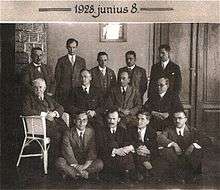József Kürschák
| József Kürschák | |
|---|---|
 Left to right, standing: Frigyes Riesz, Béla Kerékjártó, Alfréd Haar, Gyula Kőnig, Rudolf Ortvay, on chairs:
József Kürschák, George David Birkhoff, O.D. Kellog, Lipót Fejér, sitting on the floor: Tibor Radó, István Lipka, László Kalmár, Pál Szász | |
| Born |
14 March 1864 Buda, Kingdom of Hungary |
| Died |
26 March 1933 (aged 69) Budapest, Kingdom of Hungary |
| Nationality | Hungary |
| Fields | Mathematics |
| Institutions | Technical University of Budapest |
| Alma mater | Technical University of Budapest |
| Doctoral students | Dénes Kőnig |
József Kürschák (14 March 1864 – 26 March 1933) was a Hungarian mathematician noted for his work on trigonometry and for his creation of the theory of valuations.[1] He proved that every valued field can be embedded into a complete valued field which is algebraically closed. In 1918 he proved that the sum of reciprocals of consecutive natural numbers is never an integer. Extending Hilbert's argument, he proved that everything that can be constructed using a ruler and a compass, can be constructed by using a ruler and the ability of copying a fixed segment. He was elected a member of the Hungarian Academy of Sciences in 1897. He was one of the main organisers of mathematics competitions, for example, Eötvös Loránd mathematics competition.[2]